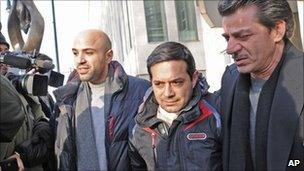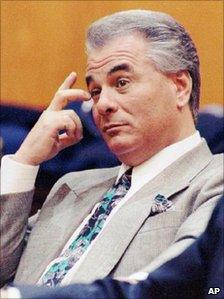Can the FBI take down New York's 'mobsters'?
- Published

Angelo Spata is accused of working with the Colombo crime family
When the FBI comes knocking before breakfast time, it is probably bad news.
For more than 100 New York residents, Thursday morning brought a rude awakening.
All are accused of working with or of being members of the city's five mafia families.
They face charges ranging from drug dealing to murder. A number have appeared in court and have entered not guilty pleas.
The Genovese, Gambino, Lucchese, Colombo and Bonnano families have controlled organised crime in New York for decades.
While their power is often portrayed as fading, many who have knowledge of the US mafia say it remains a powerful criminal force.
'Senior figures'
The authorities have made much of the senior figures they say were arrested in Thursday's dawn raids, including the alleged Colombo street boss Andrew Russo, and alleged Gambino consigliere Joseph Corozzo.
Law enforcement agents' goal is to disrupt the mob's ability to operate by taking out those in charge.
"Your intention is to bring them to a shadow of what they used to be and hopefully eliminate them entirely," Paul Browne, deputy commissioner at the New York Police Department (NYPD), told the BBC.
But others question the authorities' ability to topple La Cosa Nostra, as the Sicilian Mafia is known, noting that the family structure makes it particularly resilient.
"There is always a replacement figure available to move in," said Salwyn Rabb, former New York Times crime reporter and author of the book Five Families.
"To them, the big bust is a promotion opportunity. Every 25 years there's a big arrest, major pronouncements and somehow they survive."
Such arrests tend to attract huge media attention.
'Celebrity' gangsters
Long before Tony Soprano graced TV screens, New York's real-life gangsters achieved celebrity status.

Gambino family boss John Gotti personified the "dapper don"
Chief among them was John Gotti, boss of the Gambino family, who was convicted in 1992 of 13 murders and a litany of other offences.
Since then, there has been a perception that the power of New York's five families has waned.
Jennifer Mascia, whose father worked with the Gambino family when she was a child, said he came from an age when everyone was a stylish "dapper don" and tended to rely on charm, rather than violence.
Then, she said, the mob's nature started to change: loyalty began to erode, and men seeking to leave the mob had two choices, jail or death.
"They were whacking each other left and right," she said. "A lot of that family aspect started to degrade."
Mr Raab says the recent arrests prove the families have continued to operate, though more discreetly than in the past.
He noted the lack of "big names" among the arrests - "no John Gottis".
"Most of these people are unknown to the public, which just proves how much they have prospered over the last few decades," he said.
After the 11 September 2001 terror attacks, the FBI and other law enforcement agencies shifted much of their attention to counter-terrorism, giving the mob what Mr Raab described as a "terrific reprieve".
No glamour
The anticipated spectacle of 120 well-coiffured gentlemen in double-breasted suits appearing in court will no doubt reignite the public's interest in - and awareness of - the New York mob.
But those who see the day-to-day consequences of their alleged criminality warn against romanticising the mafia.
"They tend to be not particularly educated or well spoken," Mr Browne of the NYPD said.
"When you see a dead body in real life there is no glamour to it, whether that person has been involved in criminal activity or is an innocent victim.
"The Hollywood version does not bear resemblance to what is going on in real life."
- Published20 January 2011